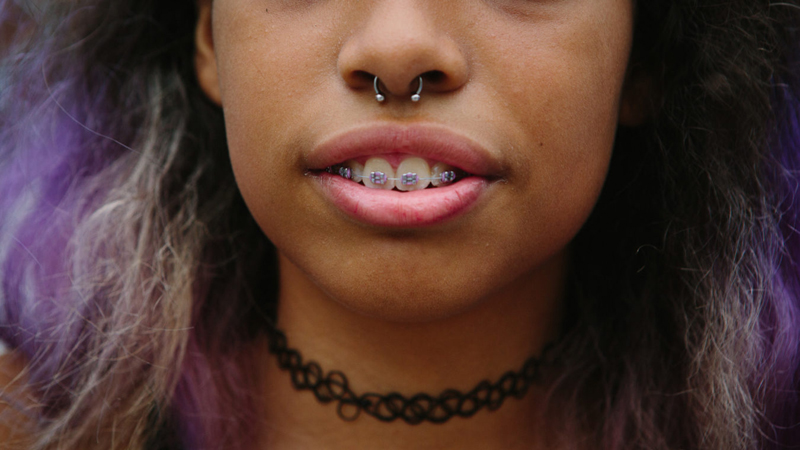
Photo Credit: Cassandra Giraldo
Shadow & Act | Nijla Mumin
I never considered myself light skin, though many would say my complexion falls within that spectrum. I never fit the “light skin, long hair” image because, while my hair was pretty long, it was also thick, and well, nappy. Recently I began holding casting meetings with actors for principal roles in my first feature film. The roles call for teen black girls, who have a range of quirks and personalities. However, I started to become uneasy with the possibility that many of these roles could be played by lighter skinned actors who came in to meet with me.
I imagined young black girls watching this film and instead of relating to the characters onscreen, feeling a sort of cinematic distance from them. I felt this distance growing up because many of the black female characters in film and television didn’t seem real to me. They were screaming and gyrating, begging, and crying in these very exaggerated performances that were often more spectacle, than human. I yearned for characters that were awkward, shy, and sometimes quiet, like me. Characters who liked to dance, and read, and play. Tomboys who went to prom, like Monica from “Love & Basketball,” or quirky girls like Topanga from “Boy Meets World.” It is finally my turn to create a feature film with characters that reflect the black and brown girls I know, and the black girl I was, and it’s serious matter.
The actress Tessa Thompson recently posted a quote on her Instagram and Twitter about colorism and privilege in Hollywood, and how one could work within this system, and be wary of its practices. Several people replied, some accusing her of getting roles because of her light skin. I took issue with this because Tessa Thompson is an extremely talented actress who’s been putting in work in film and television for many years, way before “Creed” and “Dear White People.” She’s no overnight success. I remember her in “Mississippi Damned,” embodying a fragile strength as the character of Kari in a multicolored black family. When I saw her in “Creed,” I didn’t see another “light-skinned girlfriend,” but a well-drawn character that I actually related to.
@TessaThompson_x Serious question: how many dark-skinned actresses do you think were seriously considered for the role of Bianca?
— devon (@devonfinestra) July 22, 2016
A couple of days into my casting meetings, I met an actress who I later looked up on Instagram. One of her photo captions contained lyrics from a song by rapper YG: “Light skin, slim fit, curly hair.” Various people posted comments, praising her for these attributes. It was clear that she thought she was beautiful for having long, curly hair and lighter skin, and that somehow this would translate into opportunities. Perhaps it would, but not in my movie.
The discussion on colorism as it relates to black actors in film and television has a tendency to become a black or white issue very quickly. It’s easier that way. Light skin black actresses have it easier than browner-skinned actresses. Lighter skin actors steal roles from their darker-skinned counterparts. But what’s easiest to conclude doesn’t always make it true, or right.
Eurocentric beauty standards have impacted the world on a global scale, not just in America, but in the West Indies, Asia, Brazil, Latin America and many countries in Africa. Some people are rubbing skin whitening creams into their faces and arms, praying for the privileges that come with whiteness, while #blackgirlmagic trends on Twitter. We’re living in a very complicated time where systems of inequality are often divorced from their context.
So, instead of attacking the root problem, which is an internalized way of thinking (whether consciously or unconsciously) and how industries are using this way of thinking to profit, we’re waging war on each other. Jesse Williams gets called out for being a biracial black man protesting police injustice, while Tessa Thompson is tasked with an age-old problem of hiring practices that have nothing to do with her, but with a system and a way of thinking that continues because people allow them to.
Casting can be as much about talent as it is about physical appearance. We want someone onscreen who will lead the audience on a journey, and who we want to look at. But, when onscreen beauty becomes synonymous with whiteness, or with lightness, there’s a problem. As a director, I rarely put complexion requirements in my character breakdowns for this reason, unless the story explicitly calls for it. Talent goes a long way, and has nothing to do with complexion. There are many black actresses who get roles because they are talented. These are the actresses I want in my movie, but at the same time, I am conscious of colorism when casting my film.
I’m not concerned with what “Hollywood” is doing because that would be futile. I am concerned with what I can do as a writer and filmmaker to create black female characters who look like me, my mother, my sisters, my best friends, my niece, my grandmother, my aunts, and the girls I teach. And some of these women are light, some are brown, some are dark, some are biracial. That’s okay. That’s blackness.
Nijla Mu’min is a writer and filmmaker from the East Bay Area. She has written for VICE, The Los Angeles Times, and Bitch Media. She is currently preparing to direct her first feature film, “Jinn.”
Photo by Cassandra Giraldo for the After School Project.
